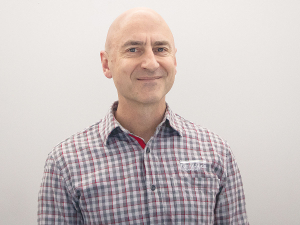Farmlands returns to profit with strong FY25 result
Rural retailer Farmlands has reported a return to profitability, something the co-operative says shows clear progress in the second year of its five-year strategy.
 Kevin Cooney, Farmlands chief operating officer says supply chain issues caused largely by the advent of Covid-19 will continue to be an issue for the foreseeable future.
Kevin Cooney, Farmlands chief operating officer says supply chain issues caused largely by the advent of Covid-19 will continue to be an issue for the foreseeable future.
Supply chain issues continue to be an ongoing issue for rural service provider Farmlands.
The co-operative released its annual results last week, reporting an $8.1 million profit on the back of $2.7 billion in turnover and $1.1 billion in revenue.
Farmlands shareholders, totalling over 75,000 nationwide, received $94.2 million in monthly rebates, discounts and loyalty redemptions over the course of the year.
Chair Rob Hewett called the result “a pass mark and a little more.”
“Our co-operative generally reacted well to supply chain issues caused by Covid-19 and managed stocks to ensure availability when products were needed. We strive to continue to do this in these unprecedented times,” Hewett says.
Kevin Cooney, the company’s chief operating officer – who was acting chief executive during the financial year – told Dairy News that the supply chain issues caused largely by the advent of Covid-19 will continue to be an issue for the foreseeable future.
“It is an issue, and it’s one that’s not easy to resolve,” Cooney says.
He says this is being seen in the increased prices for fertiliser and fuel in particular, but also in longer lead times for accessibility to key products.
“It’s also impacting the availability of key products.”
What that means for Farmlands customers, Cooney says, is that they need to start planning ahead.
He says that, overall, the results released last week were positive.
“It’s positive to have a profitable outcome, particularly when you consider that we are still transforming the business,” he says.
Cooney describes this transformation programme, nicknamed Braveheart, as “a big challenge” for the company and one that it can do better at.
The key aim of the transformation is to get back to having clarity in the core business, and to deliver that more effectively.
“It’s all about getting the right products at the right price to the right place or location for our customers,” he says.
“That transformation is working, but while the foundations are in place, focus is needed.”
He adds that one of the biggest challenges for the company have been its efforts to lean in and continue to be relevant in the face of big change.
“That’s about asking what role do we play in that change and looking at our shareholders and asking how do we support them?”
Farmlands new chief executive Tanya Houghton says the results provide an impetus for stronger results for the 2022 financial year.
“There have been plenty of exciting new innovations over the past year. We have a new online shop and our e-commerce platform has come a long way in a short space of time. This is vital, especially during lockdowns,” Houghton says.
“We have built our plan for this year around three things: safe and engaged people, unbeatable customer experience that earns trusted partner status with our customers, and delivering our budget.
“Farmlands has a committed team that want to bring more benefits direct to those that choose us to be their preferred provider.”
The World Wide Sires National All Day Breeds Best Youth Camp Best All Rounder plaudit has become family affair, with 2026 Paramount Cup winner Holly Williams following in her sister Zara's footsteps.
DairyNZ is giving New Zealand farmers a unique opportunity to gain hands-on governance and leadership experience within the dairy sector.
Herd improvement company LIC has posted a 5.2% lift in half-year revenue, thanks to increasing demand for genetics.
According to the latest Fresh Produce Trend Report from United Fresh, 2026 will be a year where fruit and vegetables are shaped by cost pressures, rapid digital adoption, and a renewed focus on wellbeing at home.
The Roar is a highlight of the game hunting calendar in New Zealand, with thousands of hunters set to head for the hills to hunt male stags during March and April.
OPINION: The past few weeks have been tough on farms across the North Island: floods and storms have caused damage and disruption to families and businesses.
OPINION: Fonterra may be on the verge of selling its consumer business in New Zealand, but the co-operative is not…
OPINION: What does the birth rate in China have to do with stock trading? Just ask a2 Milk Company.